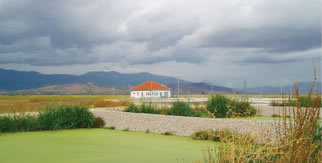
Management, Economics, and Policy
Integration: A New Framework and Strategy for Water Management in Cities and Towns
Publication Date: August 2010
Cooperating Institution: A Green Footprint, LLC
Principal Investigator: Elizabeth Striano
Project Budget: $25,000
Project Identifier: DEC1R10
DESCRIPTION
The Water Environment Research Foundation (WERF), in partnership with the Decentralized Water Resources Collaborative (DWRC), and the U.S. Environmental Protection Agency (U.S. EPA) hosted a meeting June 14, 2010, at the Ronald Reagan Building and International Trade Center, Washington, D.C. The meeting provided a forum for participants to discuss development of an integrated, sustainable water infrastructure for towns and cities in the United States and the role of federal agencies in supporting the transition to these new approaches. Meeting participants included approximately 100 federal agency staff, foundation representatives, researchers and academics, decentralized systems practitioners, and others interested in 21st century sustainable water infrastructure.
Historically, "siloed" bureaucracies have driven construction of single-purpose, centralized infrastructures to meet societal needs. To build a sustainable future, however, water management needs to integrate planning and design for all water systems, including drinking water, wastewater, stormwater, and water that provides recreational and other ecosystem services. In addition, sustainable water management requires integration with other infrastructure systems, including energy, transportation, and building. Future smart "networks" will provide significant synergies of design, cost-savings, and positive benefits for society, such as increased green space, restoration of waterways, improved air quality, and economic development through creation of green jobs.
Experts in sustainable water infrastructure management presented new thinking on these integrated systems, including case studies from across the United States. Federal agency representatives shared their agencies’ vision and role in helping to develop and implement these new approaches to sustainability and design.
The presentations were followed by a facilitated discussion session with all participants to allow ideas and information about ongoing and existing projects and other related efforts to be shared.
The primary objectives of the meeting were to:
- Present the latest information on new water infrastructure approaches to achieve ecosystem, economic, social, and other benefits for the nation.
- Share information about programs, activities, and interests related to these systems.
- Identify research needed to advance science and knowledge.
- Discuss the role of federal leadership and recommended strategies by agencies.
A meeting summary report summarizes the speaker presentations and synthesizes major themes that emerged during the half-day meeting. Materials from the meeting, including speaker bios, an agenda, and a list of participants and additional supporting materials are available at www.werf.org/integration.
Associated Documents:
Project Website
Meeting Summary Report

